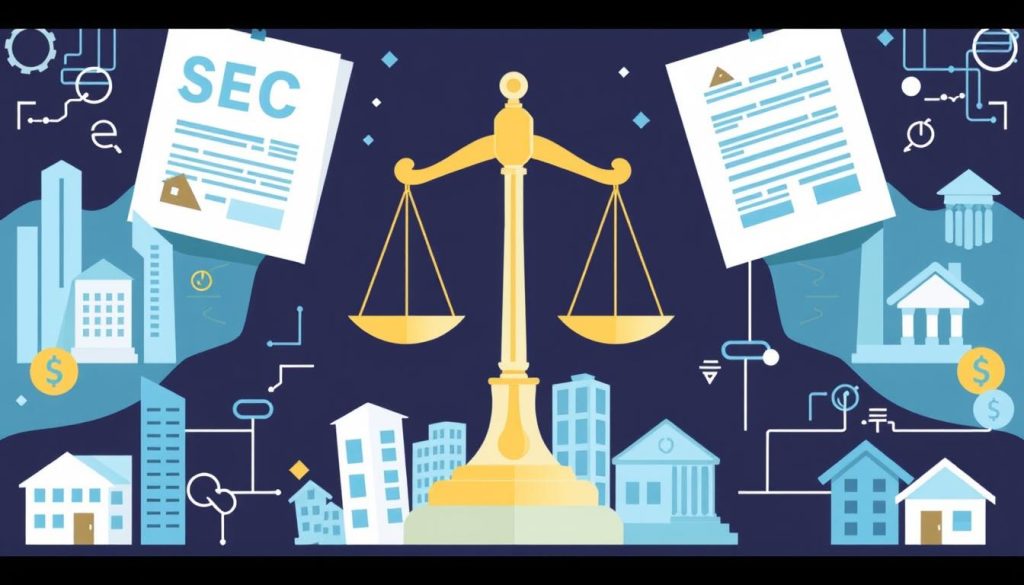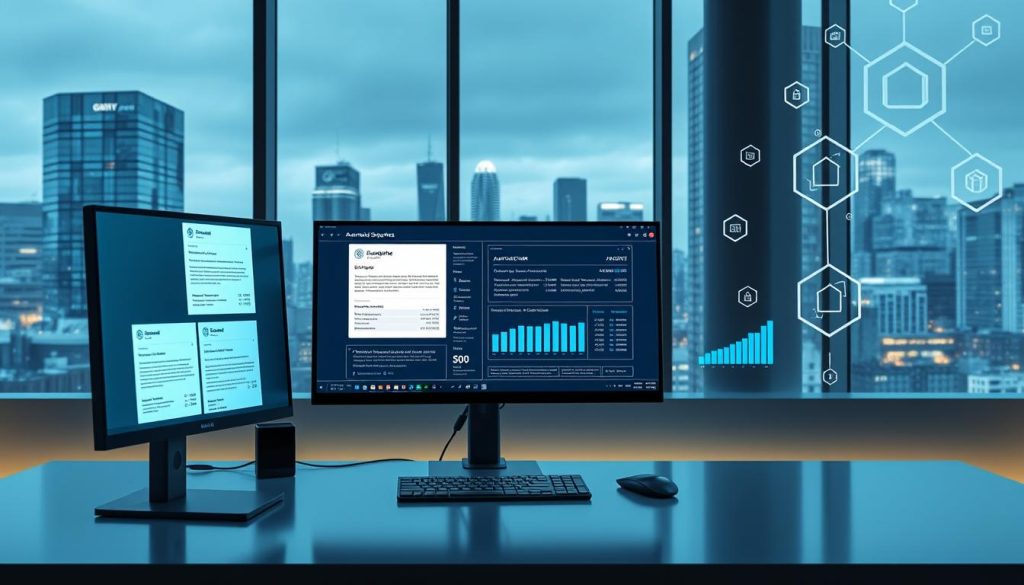Real estate crowdfunding platforms are revolutionizing property investment. They use cold emails to reach out to potential backers. A good real estate crowdfunding email can attract new investors and funding.
In today’s digital world, effective communication is vital for fundraising. Platforms need to create engaging investor pitch decks. These decks, combined with targeted cold emails, are a strong way to draw in backers.
The success of these platforms depends on their ability to connect with investors through clear emails. By perfecting cold emailing, they can grow a strong network of backers. This helps their projects soar to new levels.
Key Takeaways
- Cold emails are crucial for real estate crowdfunding platforms to engage potential backers
- Well-crafted investor pitch decks enhance the effectiveness of cold email campaigns
- Clear and persuasive communication is key to successful fundraising strategies
- Targeted emails can help build a strong network of investors
- Digital communication is reshaping the landscape of real estate investment
Understanding Real Estate Crowdfunding Platforms and Their Email Marketing Needs
Real estate crowdfunding platforms have changed how people invest in property. They let regular folks join in on deals that used to be for the rich. Email marketing is key for these platforms to reach out to potential investors and share new opportunities.
Current State of Real Estate Crowdfunding
The market for real estate crowdfunding is growing fast. People are attracted to the chance for big returns and diversifying their investments. Now, there are many options available, from commercial buildings to homes.
| Year | Market Size (USD) | Growth Rate |
|---|---|---|
| 2020 | 13.2 billion | – |
| 2021 | 15.9 billion | 20.5% |
| 2022 | 18.7 billion | 17.6% |
Why Email Remains the Primary Communication Channel
Email is still the best way to talk to investors. It lets them get messages directly and personally. Platforms use it to share new investment chances, keep them updated on projects, and teach them about real estate.
Understanding Investor Psychology in Real Estate
How investors think is very important in real estate crowdfunding. They look for a mix of risk and reward. They want to know everything clearly, get updates often, and know how to get out of their investment.
Platforms need to show how much an investment is worth when they pitch it. This helps investors see what they might get and what risks they might take. By talking about this in their emails, platforms can keep investors interested and involved.
Building a Strategic Investment Email Database
Creating a strong email database is key for real estate crowdfunding sites. A good list helps you reach out to investors better. This makes VC due diligence and equity financing smoother. Let’s look at how to build a strong investment email database.
Begin by sorting your audience by what they like to invest in, how much risk they take, and their past actions. This way, you can send messages that really speak to them, boosting your chances of getting a response. Use data enrichment to learn more about your leads, making your messages even more personal.
It’s vital to follow data protection laws like GDPR and CAN-SPAM Act. Make sure your database meets these standards. Keep your list clean by removing people who don’t open your emails and updating their info.
“A strategic investment email database is the backbone of successful real estate crowdfunding campaigns.”
Use lead magnets like special reports or guides to draw in quality subscribers. This not only grows your list but also shows investors the value you offer right away.
| Database Building Strategy | Benefits |
|---|---|
| Segmentation | Targeted communication, improved engagement |
| Data Enrichment | Enhanced personalization, better investor insights |
| Compliance Focus | Legal protection, trust building |
| Lead Magnets | List growth, value demonstration |
By using these strategies, real estate crowdfunding sites can create a top-notch email database. This database helps with reaching out to investors and makes equity financing smoother.
Real Estate Crowdfunding Engagement Email Best Practices
Effective email communication is key for real estate crowdfunding platforms. They need to engage potential investors. By using proven strategies, platforms can increase response rates and attract more investors. Let’s look at the best ways to write emails that grab the attention of real estate investors.
Personalization Techniques for Higher Response Rates
Customizing emails for each investor boosts engagement. Use their data to tailor content. Mention term sheets that match their interests to show value.
Subject Line Optimization for Investor Emails
Make subject lines interesting and highlight unique deals. Include property types, expected returns, or limited-time offers. For example: “Exclusive: 8% Cap Rate Multifamily Deal in Austin”
Content Structure and Value Proposition
Organize emails with clear sections. Outline the investment opportunity, benefits, and risks. Show what makes your platform special, like unique deal flow or cap table tools.
Call-to-Action Strategies
Use strong language in your CTAs. Create a sense of urgency with limited spots or time-sensitive offers. Examples include “Reserve Your Spot Now” or “Review Term Sheet Today”.
| Email Element | Best Practice | Example |
|---|---|---|
| Personalization | Use investor name and investment history | “Based on your interest in multifamily properties…” |
| Subject Line | Highlight unique opportunity | “12% IRR Commercial Property – Exclusive Access” |
| Content Structure | Clear sections with key information | Investment overview, financials, risk factors |
| Call-to-Action | Create urgency | “Only 5 investment slots remaining – Act now!” |
Crafting Compelling Investment Pitch Decks for Email Campaigns
Making a great pitch deck for real estate crowdfunding is key to drawing in investors via email. A well-made deck can be the deciding factor between getting funding and missing out.
Essential Elements of a Real Estate Investment Pitch
Your pitch deck should cover the property, market analysis, financial outlook, and the team. Emphasize what makes your project special and the potential gains to grab investor attention.
- Property details and location highlights
- Market demand and growth potential
- Financial projections and ROI estimates
- Team expertise and track record
- Risk mitigation strategies
Visual Data Presentation Guidelines
Use visuals to simplify complex data. Include charts, graphs, and infographics to show market trends, financial forecasts, and comparisons.
Project Timeline and Exit Strategy Communication
Be clear about the project timeline and exit strategy. This gives investors a full view of the investment. Include milestones, the founder vesting schedule, and when investors can get their money back.
| Project Phase | Timeline | Key Milestones |
|---|---|---|
| Acquisition | Month 1-3 | Property purchase, initial renovations |
| Development | Month 4-12 | Major improvements, leasing |
| Stabilization | Month 13-24 | Reach target occupancy, optimize operations |
| Exit | Month 25-36 | Refinance or sell property |
By showing a clear exit strategy, you prove you have a solid plan for investor returns. This builds trust and shows you’re committed to adding value throughout the investment journey.
Due Diligence Documentation in Cold Emails
Real estate crowdfunding platforms need to find a balance. They should be clear but not too detailed in cold emails. This is like what VCs do, checking out potential investments before they put in money.
To grab the attention of potential backers, platforms should share important financial details. These might include:
- Property acquisition cost
- Projected rental income
- Estimated return on investment
- Market comparables
Sharing these details helps investors make smart choices. It keeps them from getting lost in too much information. A brief summary of the findings can spark interest and lead to more questions.
“Transparency in due diligence documentation builds trust and credibility with potential investors, setting the stage for successful fundraising campaigns.”
By sharing clear, factual data in cold emails, platforms show they’re serious about vetting. This attracts serious investors and helps platforms stand out in a crowded market.
Legal Compliance and Regulatory Considerations in Email Outreach
Real estate crowdfunding platforms face a complex set of rules when using email outreach. It’s vital to follow these laws to protect investors and keep the industry trustworthy.
SEC Guidelines for Email Communication
The Securities and Exchange Commission (SEC) has strict rules for email talks about equity financing. Platforms must share all important details about investment chances. This includes risks, fees, and expected gains. Term sheets should be detailed, showing the main deal points.

Risk Disclosure Requirements
Emails must clearly show the risks involved. This helps people make smart choices. Common risks in real estate crowdfunding are:
- Market changes
- Project delays
- Investments are hard to sell
- There’s a chance to lose some or all of your money
Platforms should not promise too much or be too positive in their emails.
Anti-Spam Regulations Compliance
To follow anti-spam laws, real estate crowdfunding platforms must:
- Get clear consent before sending marketing emails
- Make it easy to unsubscribe from emails
- Show who sent the email and why
- Act fast on opt-out requests
Breaking these rules can lead to big fines and harm the platform’s reputation.
By following these rules, real estate crowdfunding platforms can earn investor trust. They can also avoid legal problems with their email outreach.
Measuring and Optimizing Email Campaign Performance
It’s key to track how well Series A investment pitch emails do. By looking at important metrics and tweaking your method, you can get more people to back your real estate crowdfunding projects.
Key Performance Indicators for Investment Emails
When checking your email campaigns, focus on these key KPIs:
- Open rate: How many opened your email
- Click-through rate (CTR): How many clicked on links
- Conversion rate: How many of those clicks turned into investments
- Bounce rate: How many emails didn’t get through
- Unsubscribe rate: How many stopped getting emails from you
A/B Testing Strategies
Boost your fundraising by trying out A/B tests on your Series A investment pitch emails. Try different things like subject lines, email content, and call-to-action buttons. See what works best with potential investors.
Analytics Tools and Reporting
Use strong analytics tools to keep an eye on your email campaign’s performance. Some top picks include:
| Tool | Key Features | Best For |
|---|---|---|
| Mailchimp | Detailed reports, segmentation | Small to medium-sized campaigns |
| HubSpot | CRM integration, automation | Large-scale fundraising efforts |
| SendGrid | Real-time analytics, API access | Tech-savvy crowdfunding platforms |
By using these tools and strategies, you can make your Series A investment pitch emails better. This will help your real estate crowdfunding platform raise more funds.
Advanced Email Automation and Follow-up Sequences
Real estate crowdfunding platforms use advanced email automation to help potential investors. These systems manage the whole investment process, from first contact to managing the cap table.
Automated email sequences guide investors through their decision-making process. They send timely updates on property details, market trends, and investment chances. This keeps communication steady without flooding the recipient’s inbox.

Personalization is key in these automated sequences. Platforms segment investors based on their interests and actions. This way, messages are tailored to fit what each investor wants to know, like founder vesting schedules for startup-like ventures.
| Email Sequence Stage | Content Focus | Call-to-Action |
|---|---|---|
| Introduction | Platform overview, investment benefits | Create account |
| Education | Market insights, real estate trends | Download whitepaper |
| Opportunity | Specific property details, ROI projections | Schedule consultation |
| Follow-up | Investment progress, cap table updates | Increase investment |
Good follow-up sequences keep investors interested in the funding process. They share updates on project progress, success stories, and special deals for loyal backers. This builds trust and encourages more investments.
Conclusion
Real estate crowdfunding emails are key for connecting with investors. They link new property investments with those eager to invest. By sending out engaging messages and pitch decks, platforms can show off great opportunities and gain trust.
Success in crowdfunding depends on good communication. Emails that feel personal, have catchy subject lines, and clear calls-to-action grab more interest. Platforms that get this right can attract more funding and grow their investor base.
In the competitive world of real estate, a good email can be a game-changer. It’s not just about sharing numbers; it’s about telling a story that speaks to investors. With compelling content and eye-catching pitch decks, platforms can stand out and turn prospects into backers.
The real estate crowdfunding world is always changing. To stay ahead, platforms need to keep up with best practices, follow the law, and keep improving their campaigns. This way, they can thrive in this fast-paced market.
FAQ
What is real estate crowdfunding?
Real estate crowdfunding lets people pool small investments for big projects. It’s done online and needs less money than traditional ways. This way, many can invest in real estate with less money.
How do real estate crowdfunding platforms use cold emails?
Platforms use cold emails to find new investors. They send out personalized emails with project details and calls to action. This aims to get people interested and to invest.
What should be included in a real estate crowdfunding pitch deck?
A pitch deck should have the project’s overview, market analysis, and financial plans. It should also include the team’s skills and how investors will get their money back. Make it short and easy to look at in an email.
How can I ensure my cold emails comply with legal regulations?
Know the SEC’s rules for emails and include all necessary warnings. Also, follow anti-spam laws. It’s smart to get a lawyer’s advice to make sure your emails are legal.
What are some effective personalization techniques for investment emails?
Use the person’s name and know their past investments. Tailor the offer to fit their interests. Also, share market news that they might find interesting.
How can I optimize my email subject lines for higher open rates?
Keep subject lines short and use strong words. Make them sound urgent or special. Avoid words that might get your email marked as spam. Try different subject lines to see what works best.
What key performance indicators (KPIs) should I track for my investment emails?
Watch open rates, click-through rates, and how many people invest. Also, track how many people unsubscribe or mark your emails as spam. This helps you keep your emails effective and legal.
How can I build a high-quality email database for real estate crowdfunding?
Get emails from events, conferences, social media, and partners. Use your website to attract investors. Keep your list clean and up-to-date to ensure it stays valuable.
What’s the importance of including due diligence documentation in cold emails?
Due diligence shows you’re open and professional. It helps investors trust you and make smart choices. But, don’t overwhelm them with too much info.
How can I effectively communicate the exit strategy in my investment emails?
Clearly explain how and when you plan to get money back. Mention possible ways to exit, like selling the property. Use simple charts or timelines to help them understand.


